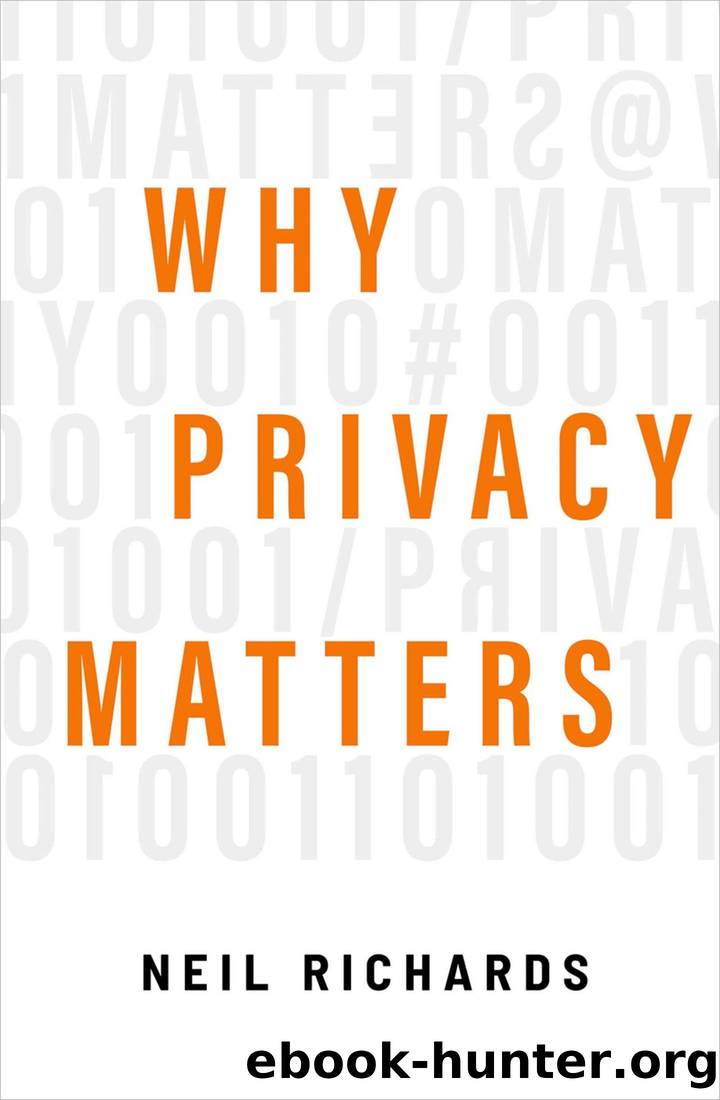Why Privacy Matters by Neil Richards

Author:Neil Richards [Richards, Neil]
Language: eng
Format: epub, azw3, mobi
Publisher: Oxford University Press
Published: 2021-11-04T23:00:00+00:00
The FBIâs letter is so outrageous that itâs worth pausing on it for a moment to appreciate what happened. The U.S. governmentâs primary law enforcement agency subjected the most significant American political dissident in the modern era to surveillance because they thought he might be a Soviet agent trying to destabilize Americaâs racially segregated social order. The official government investigation into the Dr. King wiretaps concluded in 1976, âThe FBI . . . acknowledged 16 occasions on which microphones were hidden in Dr. Kingâs hotel and motel rooms in an âattemptâ to obtain information about the âprivate activities of King and his advisersâ for use to âcompletely discreditâ them.â52
The FBIâs surveillance revealed that King was no communist agent. He was certainly trying to destabilize Americaâs racially segregated social order, but his motivations were his deeply held political and religious convictions about the basic equality of human beings, and because (as he put it so memorably) he had a dream for a better future for the country of his birth. Yet while the FBIâs surveillance revealed that King wasnât a communist, it did reveal that he was having an extramarital affair, something which (to borrow the language of the NSAâs porn surveillance program) was a âvulnerability.â The FBIâs letter, accompanied by surveillance photos of King with his mistress, was an attempt to âneutralizeâ him as a threat to what the FBI saw as Americaâs national interest: Kill yourself, or we will unleash our âtruth bombâ on your family and on your political movement.
The FBI has certainly reformed its practices since its attempt to âneutralizeâ King. Some of these reforms have been a result of professionalization within the agency,53 while others have resulted from federal privacy law, which has prohibited warrantless wiretapping since 1968.54 But risksâand abusesâare inevitable, even by otherwise well-meaning agents who zealously pursue their targets and are âjust doing their jobs.â This is a particular worry at a time in American politics when nonpartisan law enforcement agencies have in the recent past been placed under significant pressure to show loyalty above all else to the president, a phenomenon documented in great detail by Andrew McCabe, a career FBI agent who served as acting FBI director during and witness to such pressure during the Trump administration.55
Beyond the ethical pressures on law enforcement, the risks of surveillance abuses are even greater in our digital world, in which more sensitive information is created and stored in digital formats and our security services have access to far more sophisticated tools than the ones used by J. Edgar Hooverâs FBI to investigate King. Imagine a dissident like Dr. King living in todayâs information age. A government (or political opponent) that wanted him silenced might be able to obtain access not just to his telephone conversations but also to his reading habits and emails. This critic could be blackmailed outright; he could be discredited by disclosure of the information as an example to others; or he could be shamed or âcanceledâ on social media. Perhaps he has not been having an affair but has some other secret.
Download
Why Privacy Matters by Neil Richards.azw3
Why Privacy Matters by Neil Richards.mobi
This site does not store any files on its server. We only index and link to content provided by other sites. Please contact the content providers to delete copyright contents if any and email us, we'll remove relevant links or contents immediately.
Cecilia; Or, Memoirs of an Heiress — Volume 1 by Fanny Burney(32558)
The Great Music City by Andrea Baker(32018)
Cecilia; Or, Memoirs of an Heiress — Volume 2 by Fanny Burney(31956)
Cecilia; Or, Memoirs of an Heiress — Volume 3 by Fanny Burney(31941)
We're Going to Need More Wine by Gabrielle Union(19046)
All the Missing Girls by Megan Miranda(16026)
Pimp by Iceberg Slim(14506)
For the Love of Europe by Rick Steves(14121)
Bombshells: Glamour Girls of a Lifetime by Sullivan Steve(14074)
Talking to Strangers by Malcolm Gladwell(13370)
Norse Mythology by Gaiman Neil(13363)
Fifty Shades Freed by E L James(13239)
Mindhunter: Inside the FBI's Elite Serial Crime Unit by John E. Douglas & Mark Olshaker(9341)
Crazy Rich Asians by Kevin Kwan(9291)
The Lost Art of Listening by Michael P. Nichols(7506)
Enlightenment Now: The Case for Reason, Science, Humanism, and Progress by Steven Pinker(7313)
The Four Agreements by Don Miguel Ruiz(6765)
Bad Blood by John Carreyrou(6621)
Weapons of Math Destruction by Cathy O'Neil(6279)
